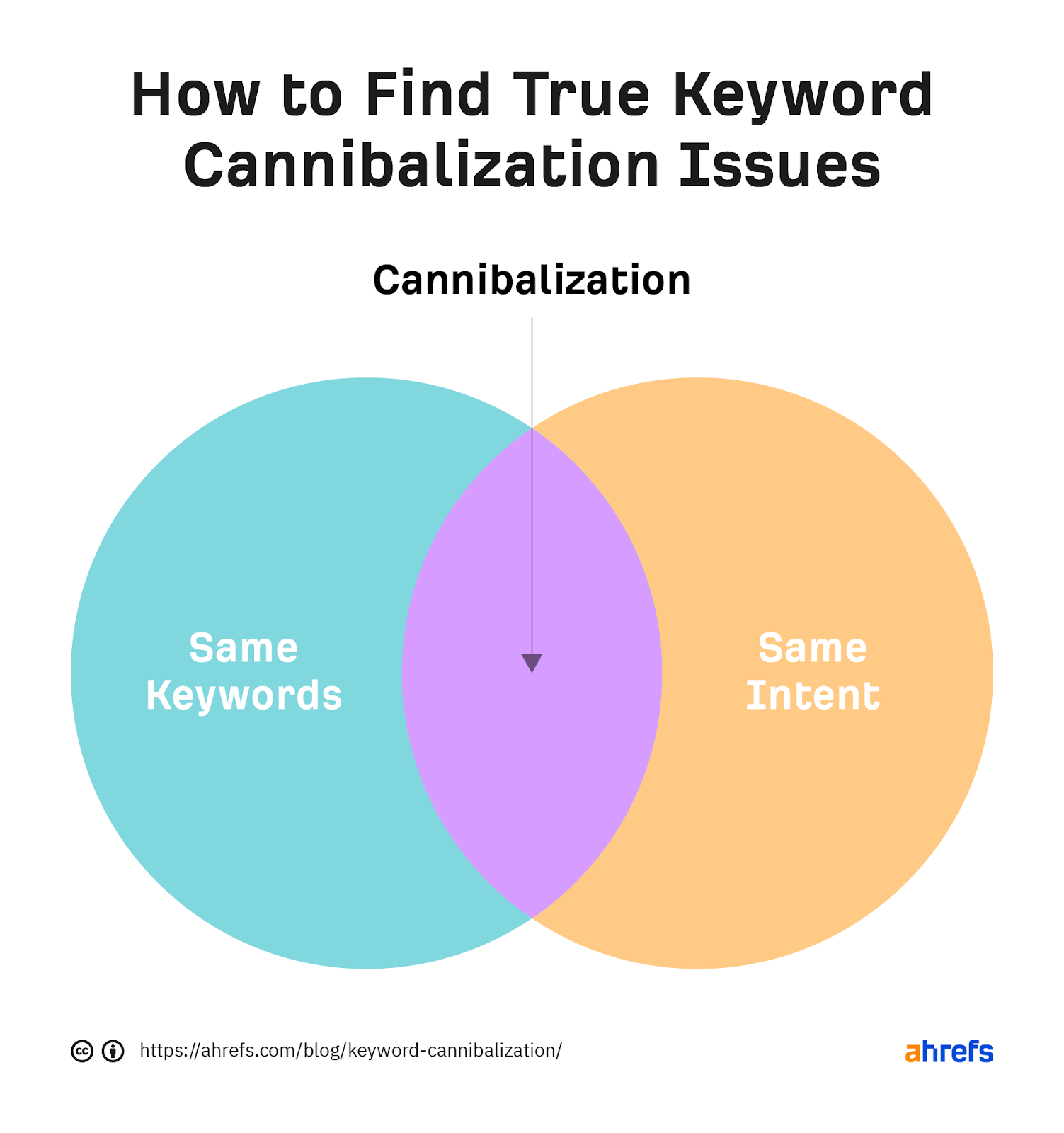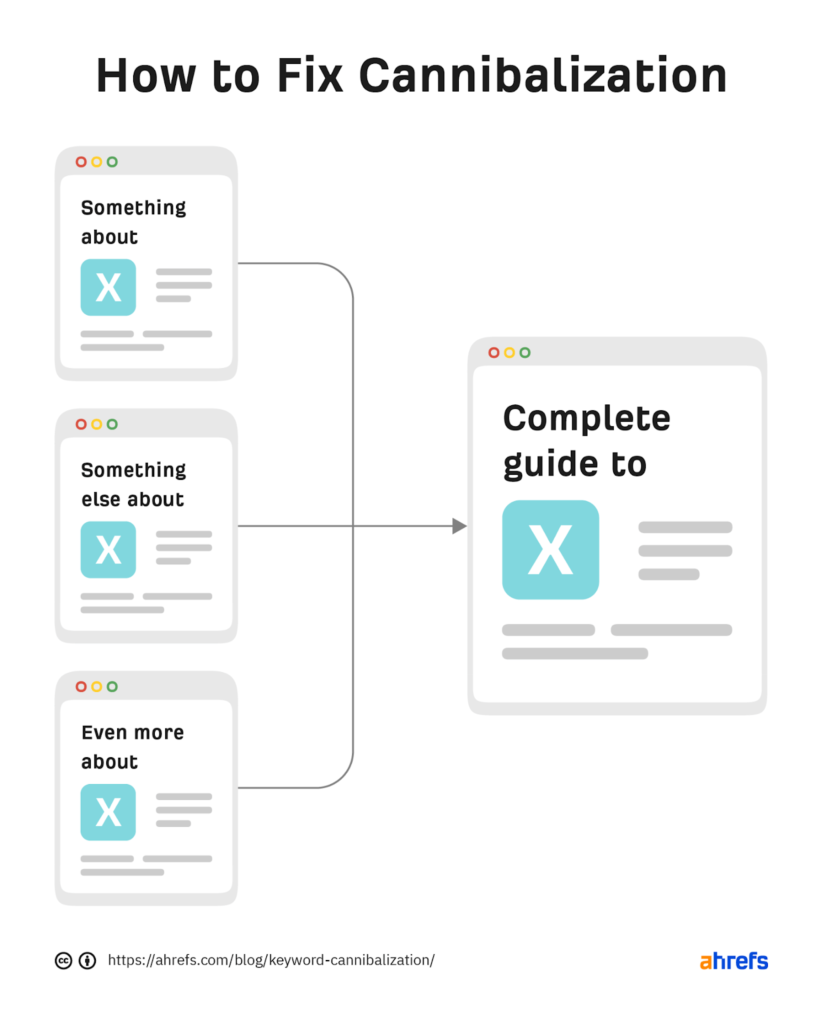Keyword cannibalization occurs when multiple pages on a website target the same keyword, causing confusion for search engines. This can lead to lower rankings and reduced traffic for all affected pages.
Understanding keyword cannibalization is crucial for effective SEO. It hinders your website’s ability to rank well by splitting authority among multiple pages. This issue often arises from a lack of content strategy or oversight. As a result, valuable keywords may not drive the traffic they deserve.
Fixing this issue involves consolidating content, updating internal linking, and optimizing the target keywords for clarity. By addressing keyword cannibalization, you can enhance your site’s visibility and improve user experience, ultimately leading to better search engine rankings and increased organic traffic.

Credit: rankmath.com
Introduction To Keyword Cannibalization
Keyword cannibalization occurs when multiple pages on a website target the same keyword. This can confuse search engines. It makes it hard for them to determine which page to rank. Understanding this issue helps improve SEO and site performance.
The Basics
Keyword cannibalization happens when:
- Two or more pages compete for the same keyword.
- Each page tries to rank for the same search intent.
This can lead to:
- Lower overall rankings.
- Split traffic between pages.
- Poor user experience.
In simple terms, it’s like having multiple friends trying to get the same attention. Only one can shine at a time.
Why It’s A Problem For Seo
Keyword cannibalization can harm your site’s SEO. Here’s why:
| Issue | Impact |
|---|---|
| Lower Rankings | Search engines get confused. |
| Split Traffic | Users may not find the best page. |
| Poor User Experience | Visitors may leave frustrated. |
These problems can lead to less visibility. Your website may not reach its full potential.
Identifying Keyword Cannibalization
Keyword cannibalization occurs when multiple pages compete for the same keyword. This can confuse search engines and lower your rankings. Identifying this issue is essential for improving your SEO strategy. Here’s how to spot keyword cannibalization effectively.
Tools And Techniques
Several tools can help you identify keyword cannibalization:
- Google Search Console: Check which pages rank for specific keywords.
- Screaming Frog: Crawl your site to find duplicate content.
- Ahrefs: Analyze keyword rankings and find competing pages.
- SEMrush: Look for keyword overlaps in your content.
Techniques to identify cannibalization include:
- Performing a site search on Google with
site:yourdomain.com. - Creating a keyword map to track keyword usage.
- Reviewing your analytics for organic traffic patterns.
Common Signs
Watch for these signs of keyword cannibalization:
| Sign | Description |
|---|---|
| Low Rankings | Multiple pages rank poorly for the same keyword. |
| Traffic Drops | Overall traffic declines due to internal competition. |
| Similar Meta Tags | Multiple pages use the same title and description. |
| High Bounce Rates | Visitors leave quickly, confused by similar content. |
Identifying keyword cannibalization is crucial. Use these tools, techniques, and signs
The Impact On Your Website’s Seo
Keyword cannibalization occurs when multiple pages target the same keyword. This can significantly affect your website’s SEO performance. It creates confusion for search engines and users alike. Understanding its impacts is crucial for optimizing your site.
Search Rankings
Search rankings are vital for visibility. Keyword cannibalization can lead to the following issues:
- Multiple pages competing for the same keyword.
- Lower rankings due to diluted relevance.
- Reduced authority for individual pages.
This competition can confuse search engines. They may struggle to determine which page to rank. As a result, you might see:
- Fluctuating rankings.
- Loss of traffic.
- Decreased click-through rates.
User Experience
User experience suffers due to keyword cannibalization. Visitors may find multiple pages with similar content. This can lead to:
- Confusion about which page to trust.
- Frustration when seeking specific information.
- Higher bounce rates as users leave quickly.
A poor user experience can harm your site’s reputation. Users prefer clear, relevant content. If your pages compete for attention, it may drive visitors away.
Strategies To Prevent Keyword Cannibalization
Preventing keyword cannibalization is essential for effective SEO. Proper strategies can save your rankings and enhance your site’s visibility. Here are key methods to keep your keywords organized.
Keyword Research
Conducting thorough keyword research is the first step. Use tools like Google Keyword Planner or SEMrush to find suitable keywords. Focus on long-tail keywords to reduce overlap.
Here’s how to perform effective keyword research:
- Identify core topics relevant to your niche.
- Use keyword tools to find variations.
- Analyze competitors’ keywords.
- Group related keywords together.
Content Planning
Effective content planning helps maintain unique keyword targeting. Create a content calendar to organize your posts. Ensure each piece has distinct keywords.
Follow these steps for better content planning:
- List all target keywords.
- Assign keywords to specific pages.
- Avoid duplicating keywords across multiple pages.
- Regularly review and update your keyword strategy.
This approach prevents keyword overlap and boosts your content’s relevance.
Fixing Existing Cannibalization Issues
Keyword cannibalization can hurt your website’s SEO. Fixing these issues boosts your rankings. Here are some effective strategies to resolve existing cannibalization problems.
Content Consolidation
Content consolidation combines similar articles into one. This improves clarity and SEO performance. Follow these steps:
- Identify articles targeting the same keywords.
- Choose the best-performing article.
- Merge content from other articles into the chosen one.
- Ensure the new content is comprehensive and valuable.
- Redirect URLs of the old articles to the new one.
Consolidating content reduces competition between your pages. It strengthens keyword focus, making your site easier to rank.
Url Redirection
URL redirection helps maintain traffic and link equity. Use 301 redirects to point old URLs to the new, consolidated content. Follow these steps:
- Choose the best URL to keep.
- Set up 301 redirects for all other URLs.
- Test redirects to ensure they work properly.
Redirecting old URLs prevents broken links. It guides users to the most relevant content easily.
Updating Internal Links
Updating internal links is crucial for SEO. It helps users find relevant content. Follow these steps:
- Review your site’s internal links.
- Update links to point to the consolidated article.
- Remove links to any deleted or redirected articles.
Internal links improve navigation and enhance user experience. This strategy boosts authority for the consolidated page.
The Role Of Content Audits
Content audits play a vital role in identifying keyword cannibalization. They help you find pages competing for the same keywords. By performing regular audits, you can improve your website’s SEO and increase traffic. Let’s explore how to conduct effective content audits.
Regular Checks
Setting a schedule for regular checks is crucial. Here’s how to do it:
- Perform audits every 3-6 months.
- Review all existing content.
- Identify pages targeting the same keywords.
Regular checks help you maintain a clean and focused website. This prevents confusion for search engines and users.
Audit Tools
Several tools can simplify your content audits. Here are some popular options:
| Tool Name | Features |
|---|---|
| SEMrush | Keyword tracking, site audits, competitor analysis |
| Ahrefs | Backlink analysis, content explorer, keyword research |
| Screaming Frog | SEO spider, URL analysis, on-page SEO audits |
These tools help you find duplicate content issues. They also assist in optimizing your site for better search engine rankings.
Advanced Solutions And Tools
Finding and fixing keyword cannibalization can be complex. Using the right tools can simplify this process. Here are some advanced solutions that make managing keywords easier.
Seo Software
SEO software helps identify keyword cannibalization. These tools provide insights into your website’s performance. Here are some popular options:
- SEMrush – Offers keyword tracking and site audits.
- Ahrefs – Analyzes backlinks and keyword rankings.
- Moz – Provides keyword suggestions and rank tracking.
- Yoast SEO – Optimizes content and checks for keyword overlap.
These tools help you:
- Track keyword rankings.
- Identify duplicate content.
- Optimize on-page SEO.
Analytics Platforms
Analytics platforms offer deeper insights into user behavior. Understanding how visitors interact with your site is crucial. Here are key platforms to consider:
| Platform | Features |
|---|---|
| Google Analytics | Tracks user engagement and page performance. |
| Google Search Console | Monitors search performance and identifies issues. |
| Hotjar | Provides heatmaps and user session recordings. |
Using these platforms allows you to:
- Analyze traffic sources.
- Identify high-performing pages.
- Discover underperforming keywords.
Implement these tools and strategies to combat keyword cannibalization effectively.

Credit: ahrefs.com
Case Studies And Success Stories
Understanding keyword cannibalization helps improve SEO strategies. Real-world examples show how businesses tackled this issue. Let’s explore these success stories to inspire your own approach.
Real-world Examples
Here are a few companies that effectively resolved keyword cannibalization:
| Company | Issue | Solution | Results |
|---|---|---|---|
| Company A | Multiple pages ranking for “best shoes” | Consolidated content into one high-quality page | Ranked #1 in search results |
| Company B | Two blogs targeting “healthy recipes” | Redirected one blog to the other | Increased traffic by 40% |
| Company C | Similar service pages competing | Revamped pages and focused on different keywords | Improved overall rankings and user engagement |
Key Takeaways
- Identify keyword cannibalization issues quickly.
- Consolidate similar content for better rankings.
- Use 301 redirects to guide users and boost SEO.
- Regularly audit your website for competing keywords.
- Choose the primary keyword for each page.
- Focus on creating unique, valuable content.
- Monitor rankings after making changes.
Real success stories demonstrate the importance of tackling keyword cannibalization. Learn from these examples and enhance your SEO strategy.

Credit: diggitymarketing.com
Frequently Asked Questions
What Is Cannibalization And How To Fix Cannibalization?
Cannibalization occurs when multiple pages compete for the same keywords, harming SEO. To fix this, consolidate similar content, use 301 redirects, or update metadata. Focus on creating unique, valuable pages that target distinct keywords to improve search rankings and user experience.
What Is Keyword Cannibalization?
Keyword cannibalization occurs when multiple pages on a website target the same keyword. This can confuse search engines and dilute rankings. As a result, your content competes against itself, making it harder to achieve higher visibility. Addressing this issue can improve SEO performance and enhance site clarity.
How Do You Prevent Keyword Cannibalization?
To prevent keyword cannibalization, focus on using unique keywords for each page. Conduct regular audits to identify overlapping content. Consolidate similar pages and use 301 redirects when necessary. Create a clear content strategy that assigns specific keywords to dedicated pages for better SEO performance.
How To Fix Url Cannibalization?
To fix URL cannibalization, identify competing pages using SEO tools. Consolidate similar content into one comprehensive page. Implement 301 redirects from old URLs to the new one. Update internal links to point to the main page. Regularly monitor and adjust your strategy to maintain clarity and authority.
Conclusion
Keyword cannibalization can hinder your SEO efforts and confuse search engines. Addressing this issue is crucial for improving your site’s ranking. Regular audits can help identify overlapping keywords. Consolidating content or optimizing individual pages will enhance clarity. Take these steps to ensure your website achieves its full potential in search results.

